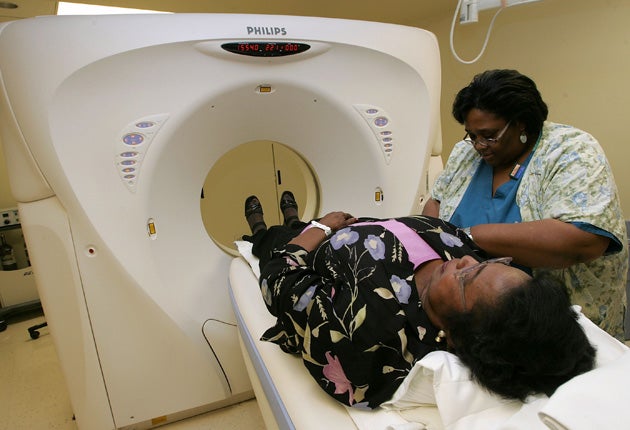CT scans 'could raise the risk of cancer'
US study shows exposure to higher levels of radiation may result in tumours

The latest generation of hospital scanners could be far more dangerous than previously believed, according to a study showing that as many as one in 80 people could be at risk of developing cancer as a result of being scanned.
Computed tomography (CT) scanners produce a much higher dose of radiation than conventional X-rays and the latest research suggests that the extra exposure could result in a 10-fold greater risk of cancer than is usually cited, scientists said.
Two studies into the growing use of CT scanners in the United States have identified wide variations in the radiation dose that patients receive, with some people receiving 13 times the level of radiation received by other CT patients, depending on their medical condition and where they were treated.
The scientists believe that the additional risks posed by CT scanners, which are used on tens of thousands of patients in Britain to diagnose a range of conditions, could result in thousands of extra cases of cancer caused by the relatively high exposure to the X-rays used in the scanners.
"The risk associated with obtaining a CT is routinely quoted as around one in 1,000 patients who undergo CT will get cancer. In our study, the risk of getting cancer in certain groups of patients for certain kinds of scans was as high as one in 80," said Rebecca Smith-Bindman, professor of radiology at the University of California San Francisco, who led one of the research teams.
"In day-to-day clinical practice, we found significant variation in the radiation doses for the same type of computed-tomography procedures within institutions and across institutions. Our results highlight the need for greater standardisation because this is a medical safety issue."
A spokesman for the Health Protection Agency in the UK said that the findings were surprising. "The risks given in the California study are high and could not arise from a single CT scan. However higher risks could occur if CT scans were used repeatedly to follow up a serious medical condition in children for example," he said.
If the American findings, reported in the Archives of Internal Medicine, can be applied to hospitals and clinics in Britain it would mean that thousands of hospital patients in the UK could end up with a potentially lethal illness as a result of receiving medical treatment.
CT scanners have become more commonplace in recent years. They work by building up 3D internal images of a patient's organs and tissues using X-rays taken in sequential cross-sections. A typical CT scan of the chest would produce a radiation dose about 100 times higher than a routine chest X-ray.
"While CT scans can provide great medical benefits, there is concern about potential future cancer risks because they involve much higher radiation doses than conventional diagnostic X-rays," said the authors of the study.
The scientists analysed the records of 1,119 patients undergoing the 11 most common types of CT diagnostic treatment in four US institutions. Using hospital records, they calculated the radiation dose involved with each scan and then estimated a lifetime risk of cancer that could be attributed to those scans.
Join our commenting forum
Join thought-provoking conversations, follow other Independent readers and see their replies
Comments